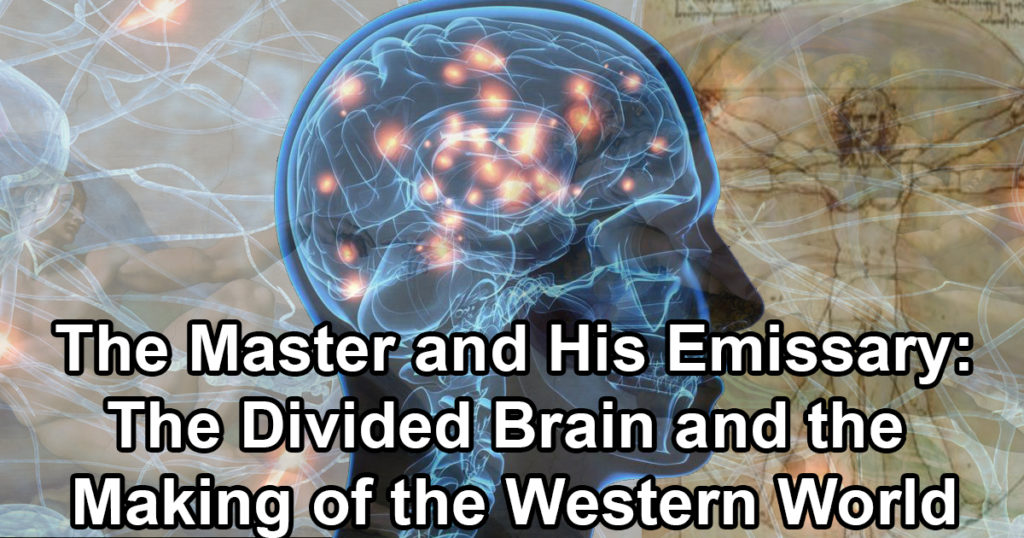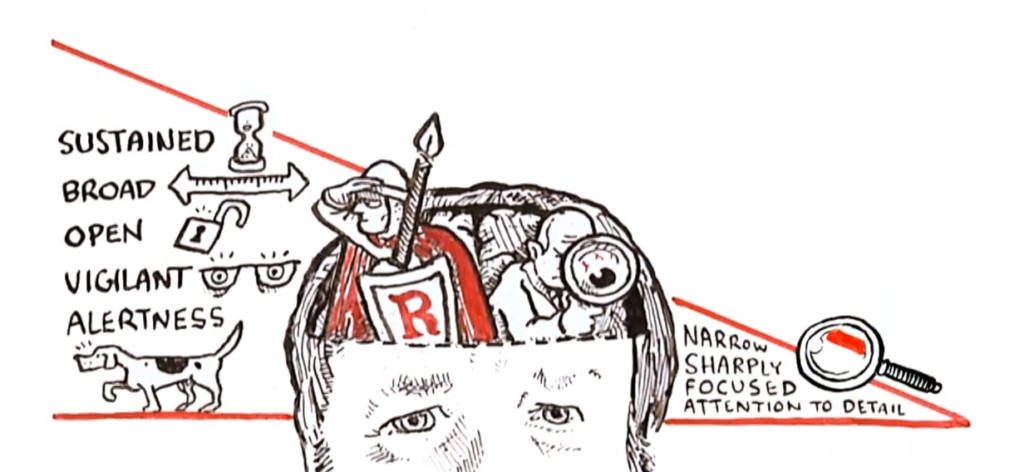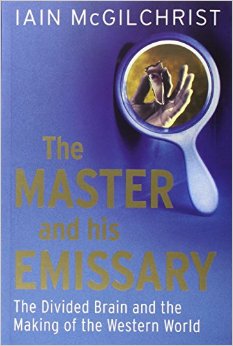
Overview
The Master and His Emissary by Dr. Iain McGilchrist is divided into two parts, much like our brains: the first focusing on recent developments in neuroscience research on our brain’s dividedness; the second, on how the West developed as a result of this dividedness.
Research shows that the brain’s two hemispheres, while separate, independent, and inhibited by the corpus callosum, function in tandem. It’s not as if one side of the brain focuses on reason and the other on emotion – a popular myth. Instead, the two hemispheres perceive the world in different ways and impart reality as they see fit.
The “Master,” the intended dominant hemisphere, is the right hemisphere. It broadly interprets reality, understands implicit meaning and metaphor, and endows us with the ability to empathize. The faithful “Emissary” is the left hemisphere, characterized by its selective attention and a desire for control and conformity. For the most part, the left hemisphere conveys to us a narrow representation of reality that is analyzable and manipulatable.
Dr. McGilchrist’s central thesis is that during the Renaissance, there was a balance of our two hemispheres. Then, somewhere along the way, the left hemisphere started becoming more assertive, and that forever changed the West.

Our Two Hemispheres
Dr. McGilchrist insists on avoiding simplistic dichotomizing: simplicity, a noble goal, especially regarding significantly dense material, must never lead to things being simpler than they are. He avoids this well, and I intend to do my best to demonstrate his primary points.
To begin: the brain is asymmetrical. Certain parts, for whatever reason, do things better than the rest. For example, the left hemisphere is central to language, and the right has by far “the preponderance of emotional understanding.” Interestingly, despite the left being the “language hemisphere,” the right is superior at understanding emotion in language.
In fact, it’s possible one could entirely lose the left hemisphere, therefore losing speech, but remain capable of producing and understanding emotional language. To be sure: the right hemisphere doesn’t use language to “manipulate ideas or things, but to understand what others mean.” This is a clear demonstration of the independent, however, synchronized, functioning of the brain.
Rather than belaboring the many differences between the hemispheres and distinguishing that yes, they do work together, I will list some of the primary differences.
The Right Hemisphere is Best at:
- Creating a sense of justice
- Empathizing with others
- Understanding facial expressions, body language, humor, and deceit
- Altruistic and mutualistic thinking
- Identifying people, experiences, and things
- All kinds of attention, except for narrow attention (a specialty of the left)
The Left Hemisphere is Best at:
- Language
- Valuing pleasure and utility
- Conveying consistent expectations based on its representation of the world
- Classifying people, experiences, and things
- Breaking processes into smaller processes
- Argument
- Systemization
- Linear thinking that insists on conformity
- Rationality
It can be said the right hemisphere is the hemisphere of ‘how.’ The left, on the other hand, with its devilish selective attention and narrow focus, is the hemisphere of ‘what.’ Deficiencies in the right hemisphere lead to an increase in mental illnesses, like schizophrenia and anorexia, and conditions such as autism.
The West’s Overreliance on the Left
In the second half of the book, Dr. McGilchrist analyzes the history of philosophy, art, and music in the West. Presumably, according to his thesis, there should be changes in Western culture as a consequence of left hemisphere aggression. Indeed, there have been many. But, it is critical to consider proper balancing of hemispherical functioning – a harmonious bicameral mind, if you will – that was evident in ancient Greece.
For instance, Greek civilization brought about the beginnings of analytic philosophy, a legal system, a political state, and the development of maps. This was the doing of the left hemisphere. Concurrently, Greek civilization was marked by “the rise of certain aspects of the ‘self’; empathy; imaginative, metaphoric language and art; humor and irony; the individual faces [in paintings]… and so on.” This was a result of right hemisphere input. After this point, though, the left hemisphere attempts to become more dominant.
During the Enlightenment, which McGilchrist characterizes as an age of hubris, the left hemisphere began to predominate significantly over the right. “The American Revolution, with its famous claims for the individual right to pursue happiness, expresses the left hemisphere’s belief that any good – happiness, for example – should be susceptible to the pursuit of the will, aided by rationality.”
Of course, the issue at hand is that the left hemisphere has decided to ignore the context of the right. Moreover, can we “pursue” happiness? Ideas such as liberty, equality, fraternity, and happiness are logically desirable, but they are not directly pursuable.
And from there, the left hemisphere continued to take control.

The Master Betrayed
Since the rise of capitalism in the eighteenth century, we have become bored. Mental illness has increased dramatically in tandem with industrialization and modernity. Indeed, illnesses like anorexia and schizophrenia are more common, as one would expect from a society of increased right hemisphere hypofunction.
Keeping this in mind, what will the West look like if our left hemisphere continues to overpower the right? For starters, we would care more about quantitative metrics rather than qualitative ones. We would demand more control and bureaucracy; the paranoia of others and the State would increase; intolerance would rise; a utility-maximizing drive, a “hedonic treadmill,” would drive mass consumerism. Empathy would suffer, and we would be less happy.
This is the Master Betrayed: a society in which the left hemisphere, the faithful emissary, has finally taken control. Perhaps we are already there.
Recommendation
Initially, I wasn’t sure if I would enjoy The Master and His Emissary. It was challenging and difficult to get through for the first 300 or so pages. I am unfamiliar with both neuroscience and philosophy, and while reading this book was provoking and informative, it was confusing. McGilchrist uses excessive jargon, and this makes the work dense.
Eventually, I came to enjoy it. It was fascinating and extremely well thought-out. If you’re interested in neuroscience, philosophy, or you want to learn something new, this book is for you. If you’re looking for light reading, this is not something I can recommend. It is one of the most difficult books I have ever read, and it felt rewarding to finish and synthesize my thoughts.
My hope is that we be more cognizant of how our brains work; to realize reality is different for everyone; to balance our beautiful bicameral mind, with the master once more reigning over his emissary.
Get your copy of The Master and His Emissary
